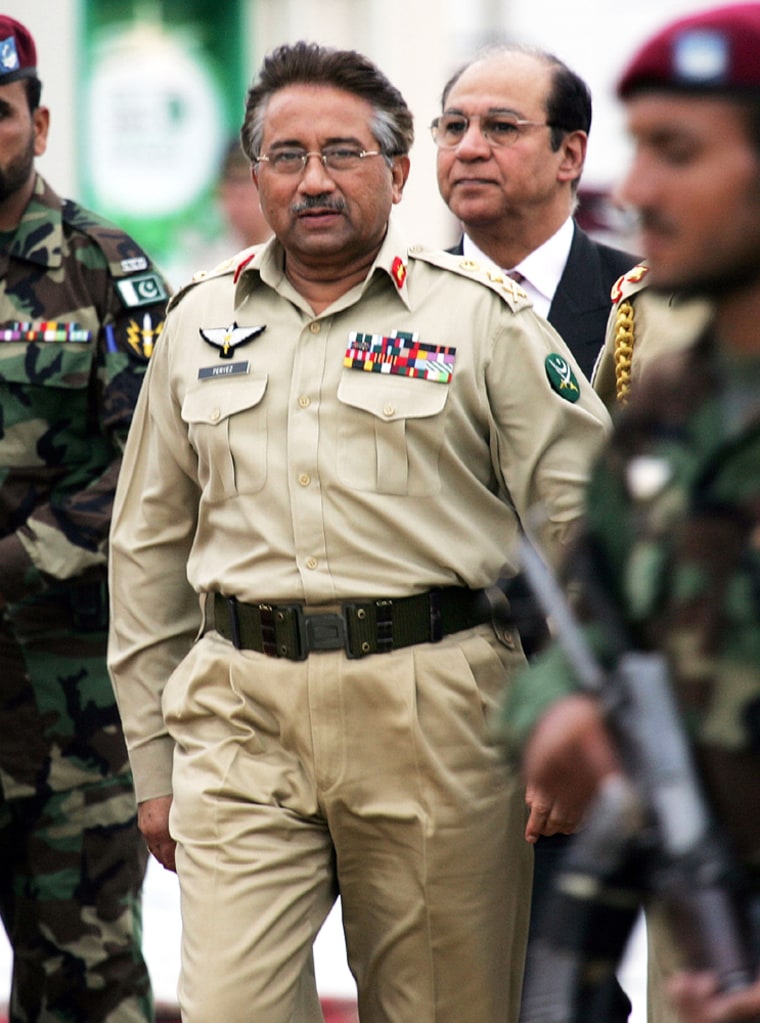Pakistani leader Pervez Musharraf will stay on as head of the armed forces and this nation's president, the information minister said Wednesday, despite a previous promise that he would give up his military post by the end of the year.
"The president will keep both the posts. The national situation demands that he keeps the two offices," Sheikh Rashid Ahmed told The Associated Press. When asked why Musharraf was going back on a promise to quit as army chief, Ahmed said "the situation has changed."
The decision comes after weeks of speculation, some fueled by Musharraf himself, that he was considering backing out of an agreement he reached in December with a hard-line Islamic political bloc to give up his army post.
Musharraf, who took power in a bloodless coup in 1999 and has emerged as a key ally in the U.S.-led war on terrorism, said earlier this month that he felt most people in the country wanted him to remain in both posts.
"Ninety-six percent (of people) will say 'do not remove (the army uniform),"' he said.
Foes see ‘lust for power’
Those comments drew an angry response from the opposition, which accused the military leader of having a "lust for power."
On Wednesday, the opposition accused Musharraf of continuing his dictatorship and lying to the nation.
"He is a dictator," said Sadique al-Farooq, spokesman for the party of former Prime Minister Nawaz Sharif, who was ousted in the coup. "His claim that he is a man of his word who fulfills his promises has proven false. He has violated the solemn pledge he has made with the nation."
Musharraf survived two attempts on his life in December, both staged in the city of Rawalpindi, where the army has its headquarters and where the president commuted from his offices in nearby Islamabad.
He announced earlier this month that he was moving the army headquarters the capital — indicating to many that he was not planning to leave either post anytime soon.
There was no immediate reaction to Musharraf's decision by the international community, but it was sure to lead to concern that Pakistan's slow and bumpy road back to democracy following the coup has all but ended.
U.S. official stressed importance of democracy
The decision comes just one day after a visiting senior U.S. State Department official stressed the importance of democracy in Pakistan.
"I think democracy, the progress toward democracy is absolutely vital for Pakistan's future and vital for the relationship that the United States and Pakistan have," Alan P. Larson, under secretary of state for economic, business and agriculture affairs, told Pakistan's Geo television on Tuesday.
Musharraf leaves for the United States Friday and is due to meet with President Bush on the sidelines of the U.N. General Assembly.
Pakistan's relationship with Washington is a complicated one.
Under Musharraf it has arrested more than 550 al-Qaida operatives and turned many over to the United States. But it has also at times been criticized for not doing enough to clamp down on the tribal border region where many top al-Qaida figures, including Osama bin Laden, are believed to be hiding.
Dozens killed in fierce fighting
Fierce fighting in the region, called North and South Waziristan, has killed dozens in recent weeks.
Musharraf may also face problems over his decision from the Commonwealth of Britain and its former colonies. The nation only recently won re-admittance to the organization after an embarrassing suspension following Musharraf's coup.
The general allowed parliamentary elections in October 2002 and turned day-to-day running of the country over to a civilian prime minister. However, he pushed through constitutional amendments that give him the power to dismiss the premier and sack parliament at his choosing.
Then, Prime Minister Zafarullah Khan Jamali stepped down in June, reportedly after a falling out with Musharraf. A pro-Musharraf party leader was named to replace him temporarily while another Musharraf ally, Shaukat Aziz, completed political maneuvering necessary for him to take over.
The opposition denounced the episode as a sham.
Opposition leaders jailed
Musharraf has also jailed several opposition political leaders, including Javed Hashmi, who received a 23-year sentence earlier this year for sedition. The opposition Pakistan People's Party nominated Hashmi to run for prime minister against Aziz in a parliamentary vote, but the government would not allow him out of his cell to participate in the proceedings, prompting a walkout by lawmakers.
Musharraf's promise to leave his army post came in December, when he reached an agreement with the opposition on a constitutional amendment that appeared to bar a single person from holding both jobs as of Jan. 1, 2005.
Ahmed, the information minister, said there was an escape clause.
"The president can keep both the offices. There is no constitutional complication," he said.
The details of the deal with the hard-line Mutahida Majlis-e-Amal coalition were never publicized, and Musharraf claims the party broke its promise to support him in a parliamentary vote of confidence.
